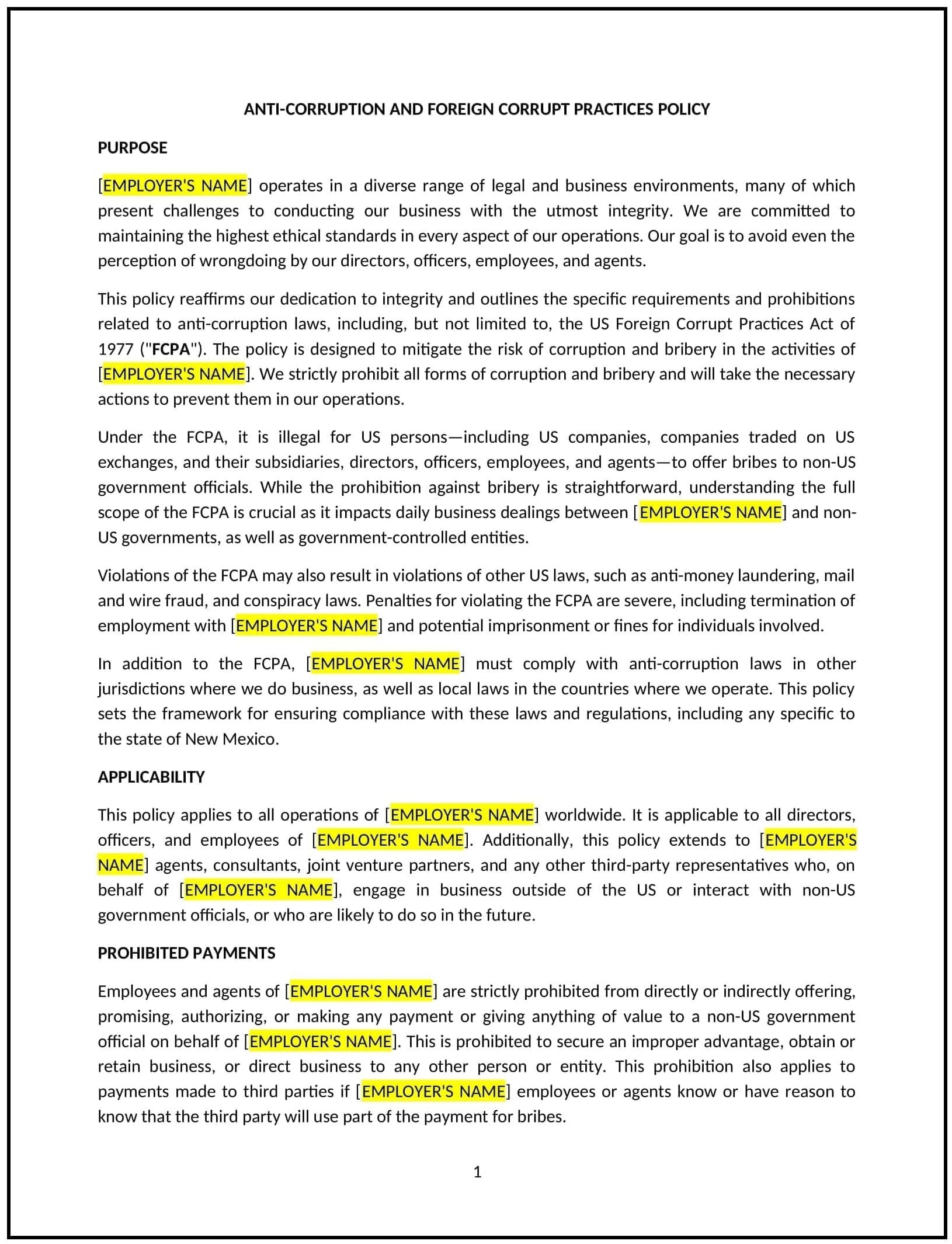Anti-corruption and foreign corrupt practices policy (New Mexico): Free template
Got contracts to review? While you're here for policies, let Cobrief make contract review effortless—start your free review now.

Customize this template for free
Anti-corruption and foreign corrupt practices policy (New Mexico)
An anti-corruption and foreign corrupt practices policy helps New Mexico businesses establish clear guidelines to prevent corrupt activities, such as bribery, fraud, and unethical behavior, in both domestic and international operations. This policy is designed to promote ethical business practices, protect the business’s reputation, and align with legal standards, including the U.S. Foreign Corrupt Practices Act (FCPA). Tailored to New Mexico’s business environment, this policy emphasizes transparency, accountability, and integrity.
By implementing this policy, businesses in New Mexico can reduce risks, build trust with stakeholders, and demonstrate a commitment to ethical conduct.
How to use this anti-corruption and foreign corrupt practices policy (New Mexico)
- Define prohibited activities: Clearly outline what constitutes corruption, including bribery, kickbacks, and improper influence in business dealings.
- Establish reporting mechanisms: Provide employees with a safe and confidential way to report suspected corrupt activities, such as a whistleblower hotline or designated contact.
- Train employees and managers: Educate staff on recognizing and avoiding corrupt practices, including the policy’s guidelines and relevant laws like the FCPA.
- Conduct due diligence: Implement procedures for vetting third parties, such as vendors, contractors, and partners, to ensure they adhere to anti-corruption standards.
- Monitor transactions: Regularly review financial records and business transactions to identify and address potential red flags.
- Communicate the policy: Share the policy with employees during onboarding and through internal communications to ensure awareness and understanding.
- Enforce consequences: Clearly state the disciplinary actions for violating the policy, including potential legal repercussions.
- Review and update the policy: Periodically assess the policy’s effectiveness and make adjustments as needed to reflect changes in laws or business practices.
Benefits of using this anti-corruption and foreign corrupt practices policy (New Mexico)
This policy offers several advantages for New Mexico businesses:
- Promotes ethical conduct: Clear guidelines help employees and stakeholders understand the importance of integrity and transparency.
- Reduces legal risks: Proactive measures minimize the likelihood of violating anti-corruption laws, such as the FCPA.
- Protects reputation: Demonstrating a commitment to ethical practices enhances the business’s credibility and trustworthiness.
- Builds stakeholder confidence: Investors, customers, and partners are more likely to engage with businesses that prioritize ethical behavior.
- Aligns with New Mexico values: The policy reflects the state’s emphasis on fairness, accountability, and community trust.
- Improves operational efficiency: Clear procedures for handling transactions and third-party relationships reduce the risk of disruptions caused by corrupt activities.
- Encourages a culture of accountability: Employees are more likely to act ethically when they understand the expectations and consequences.
Tips for using this anti-corruption and foreign corrupt practices policy (New Mexico)
- Communicate the policy effectively: Share the policy with employees during onboarding and through regular reminders, such as emails or training sessions.
- Provide training: Educate employees and managers on recognizing and avoiding corrupt practices, including the policy’s guidelines and relevant laws.
- Conduct regular audits: Review financial records and business transactions to identify and address potential red flags.
- Vet third parties: Implement due diligence procedures to ensure vendors, contractors, and partners adhere to anti-corruption standards.
- Encourage reporting: Foster a culture where employees feel safe reporting suspected corrupt activities without fear of retaliation.
- Lead by example: Ensure senior leadership demonstrates a commitment to ethical behavior and adherence to the policy.
- Review the policy periodically: Update the policy as needed to reflect changes in laws, business practices, or industry standards.